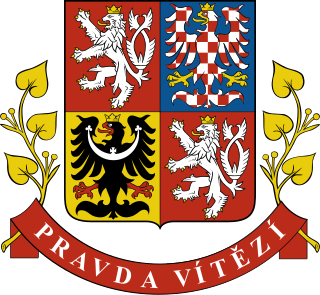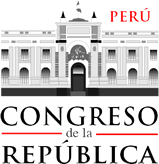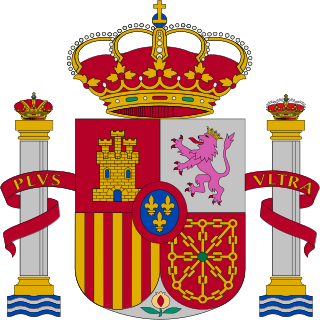
The Twelfth Amendment to the United States Constitution provides the procedure for electing the president and vice president. It replaced the procedure in Article II, Section 1, Clause 3, under which the Electoral College originally functioned. The amendment was proposed by Congress on December 9, 1803, and was ratified by the requisite three-fourths of state legislatures on June 15, 1804. The new rules took effect for the 1804 presidential election and have governed all subsequent presidential elections.

President of the Senate is a title often given to the presiding officer of a senate. It corresponds to the speaker in some other assemblies.

The Senate is the upper house of the Cortes Generales, which along with the Congress of Deputies – the lower chamber – comprises the Parliament of the Kingdom of Spain. The Senate meets in the Palace of the Senate in Madrid. The presiding officer of the Senate is the president of the Senate, who is elected by the members at the first sitting after each national election.

The president of the Czech Republic, constitutionally defined as the President of the Republic, is the head of state of the Czech Republic and the commander-in-chief of the Armed Forces of the Czech Republic.

The Senate of the Republic, constitutionally the Chamber of Senators of the Honorable Congress of the Union, is the upper house of Mexico's bicameral Congress. It currently consists of 128 members, who serve six-year terms.

The 1993 Spanish general election was held on Sunday, 6 June 1993, to elect the 5th Cortes Generales of the Kingdom of Spain. All 350 seats in the Congress of Deputies were up for election, as well as 208 of 256 seats in the Senate.

Elections in Chile are held nationwide, including the presidency, parliament, regional offices, and municipal positions. Chilean citizens and foreign residents with legal residency of at least five years, who are 18 years or older on election day, are eligible to vote. Previously, voting was voluntary, but since 2023, it has become compulsory.

The Dominican Republic is a unitary state with elected officials at the national and local levels. On a national level, head of state, the President, is elected directly by the people. The national legislature, the Congress of the Republic, is divided into two chambers: the Chamber of Deputies and the Senate. There are also elected offices at the local level. It is estimated that across the whole country, over four thousand offices are filled in every electoral cycle.

Elections in Uruguay encompass three different types: general elections, departamental elections and municipal elections. At the national level, Uruguay elects a head of state and a legislature. Voting is compulsory and extends to all citizens aged 18 and over.

The Congress of the Republic of Peru is the unicameral body that assumes legislative power in Peru. Due to broadly interpreted impeachment wording in the Constitution of Peru, the President of Peru can be removed by Congress without cause, effectively making the legislature more powerful than the executive branch. Following a ruling in February 2023 by the Constitutional Court of Peru, the body tasked with interpreting the Constitution of Peru and whose members are directly chosen by Congress, judicial oversight of the legislative body was also removed by the court, essentially giving Congress absolute control of Peru's government. Since the 2021 Peruvian general election, right wing parties held a majority in the legislature. The largest represented leftist party in Congress, Free Peru, has subsequently aligned itself with conservative and Fujimorists parties within Congress due to their institutional power.

The president of the Congress of Deputies is the speaker of the Congress of Deputies, the lower house of the Cortes Generales. The president is elected among the members of the Congress and is, after the king and the prime minister, the highest authority in the Kingdom of Spain.

The president of the Chamber of Deputies of Chile is the highest authority of the Chamber of Deputies of Chile. The office was established in 1811 by the First National Congress of Chile.

Alberto Núñez Feijóo is a Spanish People's Party politician who serves as Member of the Congress of Deputies and as president of the People's Party. He served as the President of the Autonomous Government of Galicia from 2009 to 2022. Feijóo was appointed government formateur following the 2023 election, however his investiture ultimately failed.

The president of the Senate is the presiding officer of the Spanish Senate, the upper house of Spain's Cortes Generales. It is the fourth authority of the country after the Monarch, the Prime Minister and the President of the Congress of Deputies. The president is elected among and by the incumbent senators. When the president is unable to exercise power, vice presidents of the Senate exercise the powers of the Senate president.
In the United States, a contingent election is used to elect the president or vice president if no candidate receives a majority of the whole number of electors appointed. A presidential contingent election is decided by a special vote of the United States House of Representatives, while a vice-presidential contingent election is decided by a vote of the United States Senate. During a contingent election in the House, each state delegation votes en bloc to choose the president instead of representatives voting individually. Senators, by contrast, cast votes individually for vice president.

Francesca Lluc Armengol Socias, known as Francina Armengol Socias, is a Spanish politician from the Socialist Party of the Balearic Islands. She currently serves as president of the Congress of Deputies since 2023 and as member of the Congress of Deputies from the Balearic Islands since 2023.

The Bureaus of the Cortes Generales are the governing bodies of each House of the Cortes Generales, the legislative branch of Spain. The Bureaus are made up of the President or Speaker of the House, the Vice Presidents or Deputy Speakers and the Secretaries. Each Bureau is regulated by the standing orders of its house.

The electoral system of Brazil is the set of means used to choose representatives and government members of the Federative Republic of Brazil. The current system is defined by the 1988 Constitution and the Electoral Code, in addition to being regulated by the Superior Electoral Court as delegated by law. The Constitution itself already defines three distinct electoral systems, which are detailed in the Electoral Code: proportional elections for the Chamber of Deputies, mirrored in the legislative powers at the state and municipal levels, majority elections with one or two elected representatives to the Federal Senate and majority elections in two rounds for president and other executive heads in other spheres.

The 2023 President of the Chamber of Deputies of Brazil election took place on 1 February 2023, the day after the opening day of the 1st Session of the 57th Legislature of the National Congress, almost four months after the 2022 elections. It resulted in the election of the President of the Chamber of Deputies, two vice presidents, the positions of 1st, 2nd, 3rd and 4th Secretaries and their respective replacements. They will hold a biennial term (2023-2025), making it impossible for them to be re-elected in the same Legislature - as established in Art. 5 of the Internal Regulations of the Chamber of Deputies.
































